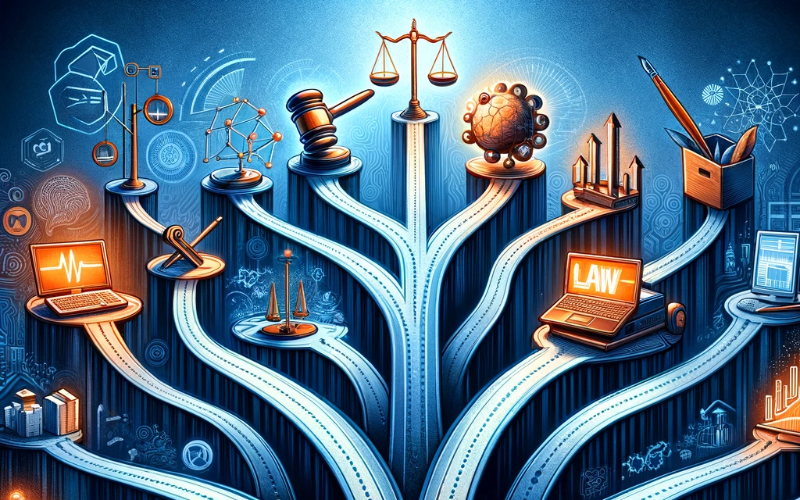Table of Contents
Understanding Soft Skills
Soft skills are the non-technical abilities that impact how you work and interact with others. They are increasingly recognized as crucial determinants of success in the workplace. Unlike hard skills, which are specific to a particular job or task and can be quantified or measured, soft skills are more about behavior, personality traits, and cognitive skills. These skills, though less tangible, are vital for creating a positive and efficient work environment and for enhancing overall job performance.
What are Soft Skills?
-
Soft skills refer to a wide array of personal attributes, including interpersonal skills, emotional intelligence, communication abilities, and more.
-
They are the skills that enable a person to interact effectively and harmoniously with other people.
Soft Skills vs. Hard Skills
-
Hard skills are the technical, specific abilities required to perform a job, often gained through education, training, and experience. These are usually the skills you list on a resume, like coding, accounting, machine operation, or foreign language proficiency.
-
Soft skills, on the other hand, are more subjective and harder to quantify. Examples include leadership, teamwork, time management, problem-solving, and adaptability.
In the next section, we'll explore the importance of soft skills in career advancement.
Importance of Soft Skills in Career Advancement

In today's dynamic workplace, the importance of soft skills cannot be overstated. They play a crucial role in every stage of a professional's career, from landing the first job to climbing the career ladder. While technical skills may get your foot in the door, it's your soft skills that will determine the height of your career trajectory.
Why Soft Skills Matter
-
Adaptability in a Changing Workplace: The modern workplace is continually evolving, making adaptability and flexibility key soft skills for success.
-
Enhancing Team Dynamics: Effective communication and teamwork lead to more productive and harmonious work environments.
-
Leadership Opportunities: Strong leadership and emotional intelligence are essential for career progression, especially into managerial roles.
Soft Skills and Professional Growth
-
Higher Job Satisfaction: Professionals with well-developed soft skills tend to have higher job satisfaction, as they can effectively navigate workplace challenges.
-
Increased Employment Opportunities: Many employers prioritize candidates with strong soft skills, recognizing their value in a collaborative and customer-focused business environment.
-
Long-term Career Success: Soft skills like problem-solving, adaptability, and emotional intelligence are crucial for long-term career success and progression.
The Impact of Soft Skills on Career Path
-
Career Longevity: Soft skills contribute to career longevity by enabling professionals to adapt to various roles and industry changes.
-
Networking and Relationship Building: Effective networking, fueled by good interpersonal skills, opens doors to new opportunities and career paths.
Next, we'll discuss the key soft skills for professional success and how to develop them.
Key Soft Skills for Professional Success
To thrive in your career, certain soft skills are universally recognized as essential. These skills enable you to interact effectively with colleagues, manage work challenges efficiently, and adapt to the ever-changing business environment.
Core Soft Skills for Career Growth
-
Communication: Both verbal and written communication skills are fundamental. They involve expressing ideas clearly, listening actively, and engaging in constructive dialogues.
-
Teamwork and Collaboration: The ability to work well with others, respecting diverse viewpoints, and contributing to shared goals.
-
Problem-Solving: Being able to identify issues, analyze information, and come up with effective solutions.
-
Adaptability: The skill of adjusting to new challenges and changes in the workplace.
-
Leadership: Not just for managers, leadership involves inspiring and guiding others, regardless of your job title.
-
Time Management: Efficiently managing your time to balance various tasks and responsibilities.
-
Emotional Intelligence: Understanding and managing your own emotions, as well as empathizing with others.
Developing Soft Skills
-
Seek Opportunities for Growth: Take on new challenges that push you out of your comfort zone.
-
Feedback and Self-Reflection: Regularly seek feedback and reflect on your interactions and performance.
-
Continuous Learning: Engage in workshops, webinars, and courses focused on soft skills development.
-
Observation and Modeling: Learn from mentors or leaders who exemplify strong soft skills.
Practical Applications
-
In Daily Interactions: Apply these skills in everyday work scenarios, from team meetings to client interactions.
-
In Conflict Resolution: Utilize emotional intelligence and communication skills to navigate and resolve workplace conflicts.
-
In Project Management: Apply leadership, teamwork, and problem-solving skills to lead and contribute to successful projects.
In the following sections, we will delve deeper into each of these key soft skills, starting with communication skills.
Developing Communication Skills

Effective communication is a fundamental soft skill in any professional setting. It involves not just speaking or writing, but also listening and understanding. Good communication fosters better relationships, enhances teamwork, and improves problem-solving.
Elements of Effective Communication
-
Clarity and Conciseness: Conveying your message in a clear, direct manner without unnecessary complexity.
-
Active Listening: Truly listening to others, understanding their perspective, and responding thoughtfully.
-
Non-Verbal Communication: Being aware of body language, facial expressions, and tone of voice, all of which can significantly impact the message.
Improving Verbal and Written Communication
-
Practice Public Speaking: Join groups like Toastmasters to improve your public speaking skills.
-
Writing Skills: Regular practice, reading extensively, and perhaps taking writing courses can enhance written communication.
-
Feedback: Actively seek and constructively use feedback to improve communication skills.
Communication in Diverse Settings
-
Adapting Your Style: Tailoring your communication style to different audiences, be it in a formal presentation or a casual team meeting.
-
Cultural Sensitivity: Being aware of cultural differences and adapting your communication accordingly.
The Role of Technology in Communication
-
Digital Communication Tools: Effectively using tools like email, instant messaging, and video conferencing.
-
Online Etiquette: Understanding the nuances of digital communication, including tone and formality.
In the next section, we'll explore the importance of teamwork and collaboration skills in professional success.
Enhancing Teamwork and Collaboration

Teamwork and collaboration are pivotal in today's interconnected and often cross-functional work environments. These skills involve not just working alongside others, but actively engaging in shared goals, respecting diverse opinions, and contributing to a collective success.
The Significance of Teamwork
-
Efficiency and Innovation: Teams that work well together can achieve more efficient and innovative outcomes than individuals working alone.
-
Diverse Perspectives: A team brings together diverse viewpoints, leading to more creative and comprehensive solutions.
-
Professional Relationships: Effective teamwork helps in building strong professional relationships, which are key for career networking.
Building Collaborative Skills
-
Active Participation: Engage actively in team discussions and projects. Offer ideas and be open to others' suggestions.
-
Conflict Resolution: Learn to manage and resolve conflicts constructively. Understand that differing opinions can lead to positive outcomes when handled properly.
-
Reliability: Be a dependable team member. Meet your deadlines and keep your promises.
Teamwork in a Remote Environment
-
Virtual Collaboration: Utilize digital tools effectively to communicate and collaborate with remote team members.
-
Regular Check-Ins: Maintain regular communication to ensure alignment with team goals and progress.
Fostering a Team-Oriented Culture
-
Leadership Support: Encourage and model teamwork from a leadership perspective.
-
Team Building Activities: Engage in activities that strengthen team cohesion and understanding.
In the next section, we'll delve into mastering problem-solving techniques, another essential soft skill for career advancement.
Mastering Problem-Solving Techniques

Problem-solving is an invaluable soft skill in the professional world. It's about identifying challenges and effectively developing solutions. Strong problem-solving abilities are crucial for career advancement as they enable you to handle complex situations, lead projects, and contribute to your organization's success.
Understanding Problem-Solving in the Workplace
-
Identifying Problems: The first step in problem-solving is recognizing a challenge or an area for improvement.
-
Analyzing the Issue: Once a problem is identified, it involves breaking it down into smaller parts to understand its various components.
-
Creative Solutions: It's not just about finding any solution, but the best one, which often requires creative and innovative thinking.
Steps in Effective Problem-Solving
-
Defining the Problem: Clearly articulate what needs to be solved.
-
Gathering Information: Collect data and insights relevant to the issue.
-
Generating Possible Solutions: Brainstorm a range of solutions without judgment.
-
Evaluating Options: Assess the pros and cons of each potential solution.
-
Implementing the Solution: Put the chosen solution into action.
-
Reviewing and Reflecting: After implementation, review the outcome and reflect on the process for future learning.
Developing Problem-Solving Skills
-
Practice and Experience: Regularly put yourself in situations where you need to solve problems.
-
Learning from Others: Observe how experienced colleagues or mentors approach problem-solving.
-
Continued Education: Participate in workshops or courses that focus on critical thinking and problem-solving.
Problem-Solving in a Team
-
Collaborative Thinking: Engage your team in the problem-solving process for diverse perspectives.
-
Encouraging Innovation: Create an environment where innovative ideas are welcomed and valued.
Next, we will explore how to build adaptability and flexibility, crucial soft skills in today's ever-changing work environment.
Building Adaptability and Flexibility

Adaptability and flexibility are key soft skills in a professional landscape characterized by rapid changes and uncertainties. These skills are about being able to pivot quickly in response to changing circumstances and thrive in dynamic environments.
The Need for Adaptability in Modern Workplaces
-
Rapid Technological Changes: The fast pace of technological advancements requires professionals to continuously adapt and learn.
-
Changing Work Dynamics: With evolving business models, being flexible in your role and responsibilities is crucial.
-
Globalization and Cultural Agility: In an increasingly global workplace, adaptability includes cultural sensitivity and the ability to work with diverse teams.
Cultivating a Flexible Mindset
-
Embracing Change: View changes as opportunities for growth rather than obstacles.
-
Resilience: Develop resilience to bounce back from challenges or failures.
-
Openness to Learning: Continuously seek opportunities to learn new skills and gain new experiences.
Strategies for Enhancing Adaptability
-
Stay Informed: Keep up-to-date with industry trends and changes.
-
Experiment and Take Risks: Step out of your comfort zone and try new approaches.
-
Flexible Planning: Set goals but be prepared to modify your plans as situations change.
Adaptability in Leadership
-
Leading by Example: Demonstrate adaptability in your approach to encourage it in your team.
-
Fostering an Adaptive Culture: Create a work environment that supports and rewards flexibility and innovation.
In the next section, we'll discuss time management, another crucial soft skill for professional effectiveness and career advancement.
Improving Time Management

Effective time management is a critical soft skill that enhances productivity and job satisfaction. It's about organizing and planning how to divide your time between specific activities to achieve maximum efficiency and productivity.
Impact of Time Management on Professional Success
-
Increased Productivity: Proper time management leads to more work being done in less time.
-
Reduced Stress: Organizing tasks and managing time effectively can significantly reduce stress levels.
-
Work-Life Balance: Good time management helps in achieving a better balance between work and personal life.
Techniques for Better Time Management
-
Prioritization: Identify the most important tasks and focus on them first.
-
Setting Goals and Deadlines: Clearly define what needs to be accomplished and by when.
-
Avoiding Procrastination: Tackle tasks head-on rather than delaying them.
Tools to Aid in Time Management
-
Calendars and Planners: Use digital or physical planners to schedule and track tasks.
-
To-Do Lists: Keep daily lists of tasks to maintain focus.
-
Time Tracking Apps: Use technology to track how much time you're spending on various tasks.
Developing a Time Management Mindset
-
Regular Review: Regularly assess how you spend your time and adjust as needed.
-
Self-Discipline: Cultivate the discipline to stick to your time management plans.
-
Flexible Adaptation: Be prepared to adjust your plans as unexpected tasks or challenges arise.
Next, we will explore how to cultivate leadership abilities, a key soft skill that can propel your career forward, regardless of your position.
Cultivating Leadership Abilities

Leadership is a multifaceted soft skill that goes beyond managing teams; it's about inspiring, guiding, and influencing others. Good leadership skills can significantly impact your career, helping you gain recognition, respect, and advancement opportunities.
Understanding Leadership in the Workplace
-
More Than a Title: Leadership isn't confined to those in managerial positions; it's about influencing others positively, regardless of your role.
-
Key Qualities: Effective leaders display qualities like empathy, decisiveness, integrity, and the ability to inspire and motivate others.
Developing Leadership Skills
-
Self-Awareness: Understanding your strengths and weaknesses as a leader.
-
Effective Communication: Clearly and effectively conveying ideas and expectations to your team.
-
Empathy: Understanding and addressing the needs and concerns of team members.
-
Decision-Making: Developing the ability to make informed and timely decisions.
Leading by Example
-
Modeling Positive Behavior: Demonstrate the behaviors and attitudes you want to see in your team.
-
Consistency: Be consistent in your actions and decisions, building trust and reliability.
Leadership in Different Situations
-
Innovation and Change Management: Lead your team through changes and encourage innovative thinking.
-
Conflict Resolution: Mediate and resolve conflicts within the team, ensuring a harmonious work environment.
Enhancing Leadership through Continuous Learning
-
Seek Feedback: Regularly ask for feedback on your leadership style and effectiveness.
-
Professional Development: Participate in leadership workshops, seminars, or courses.
In the following section, we'll discuss the importance of emotional intelligence in professional settings and how it can be fostered for career success.
Fostering Emotional Intelligence

Emotional intelligence (EQ) is the ability to understand, use, and manage your own emotions in positive ways to relieve stress, communicate effectively, empathize with others, overcome challenges, and defuse conflict. In the professional world, EQ is as important as intellectual ability (IQ) and is crucial for building strong working relationships and making informed decisions.
The Role of EQ in the Workplace
-
Enhanced Communication: Understanding your emotions and those of others can improve communication and collaboration.
-
Conflict Resolution: EQ is key in resolving workplace conflicts effectively and empathetically.
-
Building Stronger Work Relationships: High EQ helps in creating a more connected and cooperative work environment.
Components of Emotional Intelligence
-
Self-Awareness: Recognizing your own emotions and their impact on your thoughts and behavior.
-
Self-Regulation: Controlling impulsive feelings and behaviors, managing emotions healthily.
-
Motivation: Being driven to fulfill your goals.
-
Empathy: Understanding the emotions of others.
-
Social Skills: Managing relationships to move people in the desired direction.
Developing Emotional Intelligence
-
Mindfulness Practices: Engaging in mindfulness can enhance self-awareness and self-regulation.
-
Active Listening: Improving listening skills can help better understand and respond to the needs of colleagues.
-
Seeking Feedback: Regular feedback on your interactions can provide insights into your EQ strengths and areas for improvement.
EQ in Leadership
-
Empathetic Leadership: Leaders with high EQ can better connect with their team members, understand their needs, and motivate them effectively.
Next, we will explore the importance of continuous learning and maintaining a growth mindset for career advancement.
Continuous Learning and Growth Mindset

In the fast-paced and ever-evolving professional world, continuous learning and maintaining a growth mindset are indispensable for long-term career success. They involve a commitment to personal and professional development, adapting to new technologies and methodologies, and a willingness to learn from experiences and challenges.
The Importance of Lifelong Learning
-
Keeping Skills Relevant: As industries evolve, staying updated with new skills and knowledge is essential.
-
Adaptability: Continuous learning enhances your ability to adapt to new roles, technologies, and industry shifts.
-
Career Advancement: Professionals committed to learning and growth are more likely to advance in their careers.
Fostering a Growth Mindset
-
Embrace Challenges: View challenges as opportunities to grow rather than obstacles.
-
Learn from Criticism: Constructive criticism can be a valuable learning tool.
-
Celebrate Effort and Progress: Focus on the process of learning rather than the end result.
Ways to Engage in Continuous Learning
-
Professional Development Courses: Enroll in workshops, seminars, or online courses relevant to your field.
-
Reading and Research: Stay informed about industry trends and advancements.
-
Networking and Knowledge Sharing: Engage in professional groups or forums to exchange ideas and learn from peers.
Implementing Learning into Daily Work
-
Applying New Skills: Actively look for opportunities to apply what you learn in your current role.
-
Mentorship and Collaboration: Seek mentorship and collaborate with knowledgeable colleagues.
In the next section, we'll discuss effective networking strategies that can aid in career development and professional growth.
Effective Networking Strategies

Networking is a crucial component of professional growth and career development. It involves building and maintaining relationships with people who can help you learn, grow, and find new opportunities. Effective networking isn't just about collecting contacts; it's about cultivating meaningful, mutually beneficial relationships.
The Role of Networking in Career Development
-
Access to Opportunities: Networking can open doors to job opportunities, collaborations, and partnerships.
-
Knowledge Exchange: It allows for the exchange of valuable information and insights about industry trends and best practices.
-
Mentorship and Support: Building a network can connect you with mentors who can provide guidance and support.
Strategies for Successful Networking
-
Attend Industry Events: Conferences, seminars, and meetups are great places to meet professionals in your field.
-
Engage on Social Media: Platforms like LinkedIn are excellent for connecting with peers, joining professional groups, and sharing industry-related content.
-
Volunteer and Participate: Engage in community events or professional organizations to expand your network.
Building and Maintaining Professional Relationships
-
Follow-up: After meeting someone, follow up with a message or email to establish a connection.
-
Provide Value: Networking is a two-way street; think about how you can help others as well.
-
Stay in Touch: Regularly check in with your contacts to keep the relationship active.
Online Networking in a Digital Age
-
Virtual Networking Events: Participate in webinars and virtual conferences.
-
Social Media Engagement: Regularly post, comment, and engage with content in your professional sphere.
Here's a comprehensive guide on networking stratergies: How to Build a Professional Network from Scratch
Next, we'll explore how to apply soft skills in the workplace to maximize their impact on your career advancement.
Applying Soft Skills in the Workplace

Successfully applying soft skills in the workplace can transform your career trajectory. These skills enhance interactions, improve problem-solving, and foster a positive work environment, making you a valuable asset to any team or organization.
Practical Application of Soft Skills
-
In Team Collaboration: Utilize communication, teamwork, and leadership skills to enhance team performance and achieve collective goals.
-
During Conflict Resolution: Apply emotional intelligence and problem-solving skills to navigate and resolve disagreements effectively.
-
In Managing Projects: Use time management, organization, and adaptability skills to lead projects efficiently.
Everyday Scenarios for Soft Skills
-
Meetings and Presentations: Use effective communication and listening skills to engage with colleagues and present ideas clearly.
-
Feedback Sessions: Approach feedback with openness and empathy, whether giving or receiving it.
-
Networking Events: Employ interpersonal skills to build and maintain professional relationships.
Soft Skills in Leadership
-
Motivating Teams: Inspire and motivate team members through empathetic and effective leadership.
-
Mentoring and Coaching: Use your experience and knowledge to guide and support less experienced colleagues.
Continuous Improvement of Soft Skills
-
Reflect on Interactions: Regularly assess your interactions and look for areas to improve.
-
Seek Feedback: Ask for feedback on your soft skills from peers and supervisors.
In the next section, we'll discuss how to measure and enhance your soft skills, ensuring continuous personal and professional growth.
Measuring and Enhancing Your Soft Skills

Developing soft skills is an ongoing process that requires awareness, continuous effort, and a willingness to adapt and improve. Measuring and enhancing these skills are crucial for personal and professional development.
Tools and Techniques for Assessing Soft Skills
-
Self-Assessment Tools: Utilize online questionnaires or inventories to gauge your soft skills.
-
Feedback from Others: Seek constructive feedback from colleagues, mentors, or supervisors.
-
Performance Reviews: Use regular performance reviews as an opportunity to discuss and evaluate your soft skills.
Setting Goals for Soft Skill Development
-
Identify Areas for Improvement: Based on your assessments, pinpoint which soft skills you need to develop or strengthen.
-
Create a Personal Development Plan: Set specific, measurable, achievable, relevant, and time-bound (SMART) goals for your soft skill enhancement.
Strategies for Enhancing Soft Skills
-
Practice and Application: Regularly practice your soft skills in various work scenarios.
-
Learning and Development: Participate in workshops, seminars, and training sessions focused on soft skills.
-
Mentorship and Coaching: Work with a mentor or coach who can guide you in developing these skills.
Tracking Progress
-
Regular Review and Reflection: Periodically review your progress against your goals.
-
Adjustment and Adaptation: Be willing to adjust your strategies as you progress in your soft skill development.
Conclusion and Next Steps

As we conclude this comprehensive guide on developing essential soft skills for career advancement, it's important to remember that the journey of personal and professional development is ongoing. Mastering these soft skills opens up a world of opportunities and pathways for career growth and fulfillment.
Embracing the Journey of Continuous Growth
-
Lifelong Learning: The pursuit of knowledge and skill development is a lifelong journey. Continue to seek out learning opportunities to stay relevant and adaptable.
-
Career Opportunities: With your enhanced soft skills, new doors will open. Be ready to explore different career paths and take on new challenges.
Next Steps in Your Professional Development
-
Set New Goals: Based on the skills you've developed, set new professional goals that align with your career aspirations.
-
Seek Advanced Opportunities: Look for opportunities to apply your soft skills in more advanced roles, such as leadership positions or complex project management.
-
Mentorship and Guidance: Consider mentoring others in your field, sharing your knowledge and experience to guide them in their professional journey.
Staying Proactive and Engaged
-
Continuous Self-Assessment: Regularly evaluate your soft skills and identify areas for further improvement.
-
Engage in Professional Networks: Stay active in professional communities to keep abreast of industry trends and opportunities.
-
Adapt to Changes: Be adaptable to changes in your industry, embracing new challenges as opportunities for growth.
Developing soft skills is a crucial aspect of professional growth. As you continue on your career path, remember that the development of these skills is a continuous process, one that will enrich not only your professional life but also your personal interactions and experiences.









